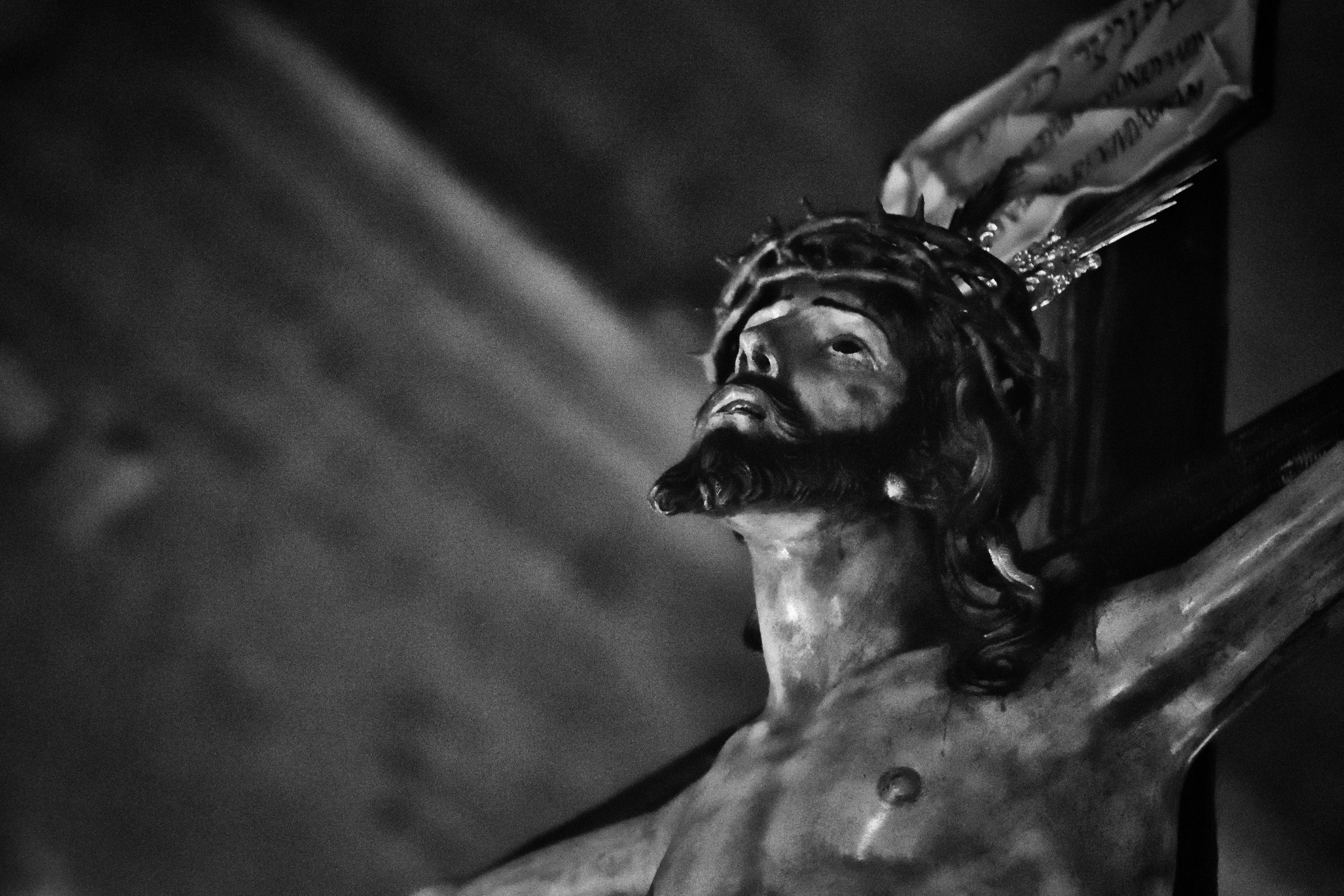I really like the words of First Corinthians 1:26-31. I guess it is because I’ve struggled all my life with poor self-esteem. That usually starts young in life after being told that you’re a bad person. The good part is that I’ve felt God being part of my life beginning at a very early age. I’ve probably mentioned it before but I’m not a cradle Catholic. I came into the church at 9 years old. But, prior to that, the pastor’s wife of a free Methodist Church would pick me up on Sunday morning and bring me to Sunday school. I would really like a picture of myself at that age (4) because my eyes must have been as big as saucers! I would look at the felt board and listen to Bible stories. I remember it like it was yesterday. That Lady was like a surrogate mother to me, but I didn’t realize it until I was about 40 years old. It was discovered during spiritual direction. I think I went through a lot of Kleenex at that moment.
Today’s First Reading talks about most of us not being of noble birth. Then it says that God chose the foolish of the world to shame the wise. I chuckle at that because I’ve seen it happen many times. Paul goes on to say that God chooses the weak of the world to shame the strong and chooses the lowly and despised of the world, those who count for nothing, to reduce to nothing those who are something.
Wow! Is that awesome or what? Except, the world does not believe that! The world tells us that we have to be powerful. And what gets power, you say? Usually, it’s money. Following the line of logic, if you have no money you have no power. But, power is not all it’s cracked up to be. At least human power.
Hopefully by now, you have felt the Lord’s presence working through you. That includes Him giving you the words to say when he places someone before you that needs help. In my opinion, one can only believe that by experience. And where does that experience come from? It is from us dying to ourselves and actually allowing the Lord to work through us. Be careful though, because when that first happens it can or may become prideful. The Lord’s words have power, especially when delivered in a gentle way. There are so many places in Scripture where this was proven and sometimes we forget that some of the greatest people in Scripture were the lowliest, at least in the eyes of the world.
I am going to get real serious now. If you have ever had the feeling of being “less than”, please hear this: Many people disregard the idea of God speaking to a person. That is because they never heard God speaking to them. Scripture tells us that God loves the poor and the lowly. How could that be true? Easy, the poor and the lowly need God to survive. So, they are in contact with the Lord every day. They do not wait for a major crisis to call on the Lord.
The secret is to die to self (sound familiar?) and open up that channel between you and God and let Eternity be your goal.
Amen?
Serving with Joy!
Me gustan mucho las palabras de 1 Corintios 1,26-31. Supongo que es porque he batallado toda mi vida con una baja autoestima. Eso generalmente comienza temprano en la vida después de que te digan que eres una mala persona. Lo bueno es que he sentido a Dios siendo parte de mi vida desde muy temprana edad. Probablemente lo he mencionado antes, pero no nací católico. Entré a la iglesia a los 9 años. Pero, antes de eso, la esposa del pastor de una iglesia metodista me recogía el domingo por la mañana y me llevaba a la escuela dominical. ¡Realmente me gustaría una foto mía a esa edad (4) porque mis ojos deben haber sido tan grandes como platos! Miraba el tablero de fieltro y escuchaba historias bíblicas. Lo recuerdo como si fuera ayer. Esa Señora fue como una madre sustituta para mí, pero no me di cuenta hasta que tuve unos 40 años. Fue descubierto durante la dirección espiritual. Creo que gasté muchos Kleenex en ese momento.
La Primera Lectura de hoy habla de que la mayoría de nosotros no somos de nacimiento noble. Luego dice que Dios escogió a los insensatos del mundo para avergonzar a los sabios. Me río de eso porque lo he visto suceder muchas veces. Pablo continúa diciendo que Dios elige a los débiles del mundo para avergonzar a los fuertes y elige a los humildes y despreciados del mundo, a los que nada valen, para reducir a la nada los que son algo.
¡Wow! ¡Qué impresionante! Solo que el mundo no cree eso. El mundo nos dice que tenemos que ser poderosos. ¿Y qué obtiene el poder? Por lo general, es el dinero. Siguiendo la línea de la lógica, si no tienes dinero no tienes poder. Pero, el poder no es tan bueno como parece. Al menos el poder humano.
Ojalá ya habrás sentido la presencia del Señor obrando a través de ti. Eso incluye que Él te dé las palabras cuando pone a alguien delante de ti que necesita ayuda. En mi opinión, uno solo puede creer eso por experiencia. ¿Y de dónde viene esa experiencia? Se trata de nosotros muriendo a nosotros mismos y permitiendo que el Señor obre a través de nosotros. Sin embargo, ten cuidado, porque cuando eso sucede por primera vez, puedes volverte orgulloso.
Las palabras del Señor tienen poder, especialmente cuando se pronuncian con dulzura. Hay tantos lugares en las Escrituras donde esto se demostró y, a veces, nos olvidamos que algunas de las personas más importantes de las Escrituras eran las más humildes, al menos a los ojos del mundo.
Voy a ponerme muy serio ahora. Si alguna vez has tenido la sensación de sentirte “menos”, por favor escucha esto: Muchas personas ignoran la idea de que Dios le hable a una persona. Eso es porque nunca escucharon a Dios hablarles. Las Escrituras nos dicen que Dios ama a los pobres y a los humildes. ¿Cómo podría ser cierto? Fácil, los pobres y los humildes necesitan a Dios para sobrevivir y por eso están en contacto con el Señor todos los días. No esperan una gran crisis para invocar al Señor.
El secreto es morir a uno mismo (¿te suena familiar?) y abrir ese canal entre tú y Dios y dejar que la Eternidad sea tu meta.
¿Amén?
¡Serviendo con Alegría!
 Deacon Dan Schneider is a retired general manager of industrial distributors. He and his wife Vicki have been married for over 50 years. They are the parents of eight children and thirty grandchildren. He has a degree in Family Life Education from Spring Arbor University. He was ordained a Permanent Deacon in 2002. He has a passion for working with engaged and married couples and his main ministry has been preparing couples for marriage.
Deacon Dan Schneider is a retired general manager of industrial distributors. He and his wife Vicki have been married for over 50 years. They are the parents of eight children and thirty grandchildren. He has a degree in Family Life Education from Spring Arbor University. He was ordained a Permanent Deacon in 2002. He has a passion for working with engaged and married couples and his main ministry has been preparing couples for marriage.
Featured Image Credit: Priscilla Du Preez, unsplash.com/photos/zcJ5lyvN_tw


 Mike Karpus is a regular guy. He grew up in Michigan’s Upper Peninsula, graduated from Michigan State University and works as an editor. He is married to a Catholic school principal, raised two daughters who became Catholic school teachers at points in their careers, and now relishes his two grandchildren, including the 3-year-old who teaches him what the colors of Father’s chasubles mean. He has served on a Catholic School board, a pastoral council and a parish stewardship committee. He currently is a lector at Mass, a Knight of Columbus, Adult Faith Formation Committee member and a board member of the local Habitat for Humanity organization. But mostly he’s a regular guy.
Mike Karpus is a regular guy. He grew up in Michigan’s Upper Peninsula, graduated from Michigan State University and works as an editor. He is married to a Catholic school principal, raised two daughters who became Catholic school teachers at points in their careers, and now relishes his two grandchildren, including the 3-year-old who teaches him what the colors of Father’s chasubles mean. He has served on a Catholic School board, a pastoral council and a parish stewardship committee. He currently is a lector at Mass, a Knight of Columbus, Adult Faith Formation Committee member and a board member of the local Habitat for Humanity organization. But mostly he’s a regular guy.






 Sheryl is happy to be the number 1 cheerleader and supporter for her husband, Tom who is a candidate for the Permanent Diaconate in the Diocese of Kalamazoo. They are so grateful for the opportunity to grow together in this process. Sheryl’s day job is serving her community as the principal for St. Therese Catholic School in Wayland, Michigan. Since every time she thinks she gets life all figured out, she realizes just how far she has to go, St. Rita of Cascia is her go-to Saint for intercession and help. Home includes Carlyn, a very, very goofy Golden Retriever and Lucy, our not-so-little rescue puppy.
Sheryl is happy to be the number 1 cheerleader and supporter for her husband, Tom who is a candidate for the Permanent Diaconate in the Diocese of Kalamazoo. They are so grateful for the opportunity to grow together in this process. Sheryl’s day job is serving her community as the principal for St. Therese Catholic School in Wayland, Michigan. Since every time she thinks she gets life all figured out, she realizes just how far she has to go, St. Rita of Cascia is her go-to Saint for intercession and help. Home includes Carlyn, a very, very goofy Golden Retriever and Lucy, our not-so-little rescue puppy. 
 Kathryn Mulderink, MA, is married to Robert, Station Manager for Holy Family Radio. Together they have seven children (including Father Rob), and four grandchildren. She is President of the local community of Secular Discalced Carmelites and has published five books and many articles. Over the last 30 years, she has worked as a teacher, headmistress, catechist, Pastoral Associate, and DRE, and as a writer and voice talent for Catholic Radio. Currently, she serves the Church by writing and speaking, and by collaborating with various parishes and to lead others to encounter Christ and engage their faith. Her website is
Kathryn Mulderink, MA, is married to Robert, Station Manager for Holy Family Radio. Together they have seven children (including Father Rob), and four grandchildren. She is President of the local community of Secular Discalced Carmelites and has published five books and many articles. Over the last 30 years, she has worked as a teacher, headmistress, catechist, Pastoral Associate, and DRE, and as a writer and voice talent for Catholic Radio. Currently, she serves the Church by writing and speaking, and by collaborating with various parishes and to lead others to encounter Christ and engage their faith. Her website is 
 Dakota lives in Denver, CO with her husband, Ralph, and their two sons, Alfie & Theophilus. She is the Dean of Enrollment Management for Bishop Machebeuf High School where her husband also teaches. You can find Dakota at the zoo or a brewery with her family or with her nose in a book at home. For more of Dakota’s writing check out
Dakota lives in Denver, CO with her husband, Ralph, and their two sons, Alfie & Theophilus. She is the Dean of Enrollment Management for Bishop Machebeuf High School where her husband also teaches. You can find Dakota at the zoo or a brewery with her family or with her nose in a book at home. For more of Dakota’s writing check out 

 Tami Urcia grew up in Western Michigan, a middle child in a large Catholic family. She spent early young adulthood as a missionary in Mexico, studying theology and philosophy, then worked and traveled extensively before finishing her Bachelor’s Degree in Western Kentucky. She loves tackling projects, finding fun ways to keep her little ones occupied, quiet conversation with the hubby and finding unique ways to love. She works at for Christian Healthcare Centers, is a guest blogger on
Tami Urcia grew up in Western Michigan, a middle child in a large Catholic family. She spent early young adulthood as a missionary in Mexico, studying theology and philosophy, then worked and traveled extensively before finishing her Bachelor’s Degree in Western Kentucky. She loves tackling projects, finding fun ways to keep her little ones occupied, quiet conversation with the hubby and finding unique ways to love. She works at for Christian Healthcare Centers, is a guest blogger on 